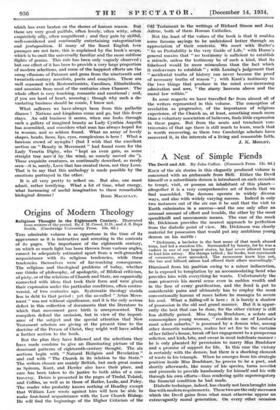Origins of Modern Theology
Religious Thought in the Eighteenth Century. Illustrated from writers of the period. By J. M. Creed, D.D., and J. S. Boys Smith. (Cambridge University Press. 10s. 6d.) Tins admirable volume is as opportune in the time of its appearance as it is instructive and arresting in the contents of its pages. The importance of the eighteenth century, on which so much light has been thrown from various angles, cannot be adequately estimated apart from a well-grounded acquaintance with its religious tendencies, while these tendencies themselves were of far-reaching consequence. The religious and theological problems of today, whether one thinks of philosophy, of apologetic, of Biblical criticism, of piety, or of the relations of Church and State, are organically connected with ideas that took their form and were given their expression under the particular conditions, often contro- versial, of two centuries ago. Systematic theology stands less in debt to that period ; yet the so-called " Arian kove- ment " was not without significance, and it is the only serious defect in this collection of documents that the literature to which that movement gave birth is unrepresented. The compilers defend the omission, but in view of the import- ance of the subject and the special attention that New Testament scholars are giving at the present time to the doctrine of the Person of Christ, they might well have added a further section to the book.
But the plan they have followed and the selections they have made combine to give an illuminating picture Of the dominant patterns of eighteenth-century thought. The six sections begin with " Natural Religion and Revelation " and end with " The Church in its relation to the State." The writers chosen are mainly British, but such great names as Spinoza, Kant, and Herder also have their place, and care has been taken to do justice to both sides of a con- troversy. Deism is presented in the pages of Tindal, Toland, and Collins, as well as in those of Butler, Leslie, and Paley. The reader who probably knows nothing of Headley except that William Law wrote against him will here be able to make first-hand acquaintance with the Low Church Bishop. He will find the beginnings of the Higher Criticism of the
Old Testament in the writings of Richard Simon and Jeer Astruc, both of them Roman Catholics.
Not the least of the values of the book is that it enables some famous sayings to be understood better through an appreciation of their contexts. We meet with Butler's " to us Probability is the very Guide of Life," with Hume's general maxim that " no testimony is sufficient to establish a miracle, unless the testimony be of such a kind, that its falsehood would be more miraculous than the fact which it endeavours to establish " ; with Lessing's judgement that " aecidental truths of history can never become the proof of necessary truths of reason " ; with Kant's testimony to the two things that produce in the mind ever-increasing adiniration and awe, " the starry heavens above and the moral law within."
In some respects we have travelled far from almost all of the writers represented in this volume. The conception of revelation as progressive, of the importance of religious experience, of the Church as, at least, something much more than a voluntary association of believers, finds little expression in these pages. But from the acute and trenchant con- troversies of that age there is still much to learn, much that is worth recovering, as these two Cambridge scholars have recovered it, in the interests of a living and reasonable faith.
J. K. MOZLEY.







































 Previous page
Previous page